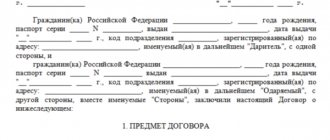Succession issues regarding the property of a deceased person are not always resolved correctly. Especially when such property is presented in the form of housing: an apartment or a private house.
Problems can arise almost out of the blue. But the basic rule is that the more successors there are, the more problems you should expect during inheritance. Therefore, it is recommended that each person leave a testamentary document in which he clearly distributes his property among his successors.
Who inherits the apartment after the death of the owner
The general rule states that the succession of the property of the deceased is possible only after receiving a certificate from the registry office, which will certify the fact of the death of the person. Inheritance is not allowed for the property of a person who is still living.
Such a certificate is issued only on the following grounds:
- in case of biological death of a person, when this circumstance is confirmed by the conclusion of professional doctors;
- by a court decision, when a person is declared dead in accordance with the procedure and grounds established by civil law.
In turn, every citizen, during his lifetime, can draw up a testamentary document in which he can dispose of his property after his death.
Thus, the will may indicate the person to whom the property of the deceased will be transferred, the distribution of property between all or several successors of the deceased, etc. may be reflected. The law does not limit the rights of citizens to dispose of their own property after death.
When a citizen does not leave such a document after his death, the list of persons enshrined in the law becomes the successors.
Thus, first of all, the mother, father, spouse and children of the deceased have the right to act as successors. Second in line are the brother, sister, and grandparents of the deceased person.
In addition, the law establishes the right of citizens to change their testamentary wills an unlimited number of times while they are alive. So, even if a certain successor has a testamentary document in his hands, this does not mean that it is valid. It could have been canceled, etc. To check this, you need to contact any notary office, which will check the validity of the will according to the register of testamentary documents.
In addition to the indicated categories of successors, the law identifies compulsory heirs who have the right to receive a share in the property of the deceased, despite the presence of a testamentary document. These include minor children of the deceased, as well as his disabled dependents.
Thus, they will receive two-thirds of what they would have been entitled to in the absence of a testamentary document.
Who will get it after the death of parents (father, mother)
When parents die, the persons they designate in their testamentary disposition are designated as successors. If such a document is not found in the notary's register, then the circle of successors is determined in accordance with the law. The order of succession will be carried out according to the previously noted list.
In addition, in the event of the death of one of the successors in the main line, the right of the person from the next position in the line may not occur, since the rule of hereditary transmission applies.
So, according to this rule:
- if the mother or father of the deceased dies, then his right passes to the grandparents, other children who are still alive, as well as the spouse;
- if one of the children dies, then his right passes to his children, if there are any, as well as to the mother or father, also if they are still alive;
- When a spouse dies, his inheritance rights are transferred to his close relatives, including children and parents.
In turn, when the right of hereditary transmission occurs, the relevant persons can give a waiver of the inheritance so that the share of the priority successors is greater. Thus, the conciliatory actions of the successors during the inheritance registration procedure are only welcome.
Who will get the apartment after the death of her husband?
When inheriting, a wife or husband has a special status due to the procedure for regulating property relations between spouses established by family law.
Thus, after the death of the other, the wife is entitled to the following part of all their property:
- half of the apartment and all other jointly acquired property;
- share in the remaining half according to the number of successors.
Thus, if a spouse leaves a will in the name of the other spouse, then that spouse accordingly becomes the owner of all property. But when there are children under 18 years of age or who do not have the ability to work, then the share due to them will be provided to them without fail.
If there are no heirs, who will get the apartment?
It is extremely rare, but there are still cases in practice when a deceased person does not have a single legal successor, and he also did not leave a testamentary document. In such cases, the further fate of the property is decided in accordance with Article 1151 of the Civil Code of the Russian Federation.
Thus, in accordance with this norm, if the deceased has no successors, then his property is transferred to the ownership of the state. If this is an apartment, then it will replenish the state housing stock and in the future can be issued to someone for the purpose of social rent, and can also be privatized again.
How much does it cost to register an inheritance with a notary?
How to enter into an inheritance after death, read here.
What to do after entering into an inheritance, read the link:
Who will get the apartment after the grandmother's death?
When a grandmother dies and does not leave a will, then, as a rule, most of her legal successors end up in the next world. But no matter how you look at it, the list of successors determined by law does not change in any way.
If the grandfather is still alive, he acts as the owner of half of the property and a share in the other half. The remainder is distributed between the children and the grandmother's parents, if they are still alive.
If no one has inherited the apartment
If there are successors who did not formalize their right of succession within the established time frame or refused this, the rule of Article 1151 of the Civil Code of the Russian Federation applies. Thus, such property will also be considered escheat and will be transferred to the ownership of the state.
The principle of inheritance of privatized residential property
Inheritance of part of privatized residential real estate must occur in accordance with established rules. The share of the deceased testator is divided in equal parts among his heirs. However, if the deceased is married, then certain difficulties may arise with the inheritance of his property, especially if he privatized the apartment with his other half and it is joint property.
Important! Regardless of the existence of a will, the spouse of the deceased testator will receive his share according to the law. If, during his lifetime, the testator transferred into possession a part of the joint property that belonged to his other half, then this clause in the testamentary act will be declared void.
Expert commentary
Kireev Maxim
Lawyer
If the apartment was privatized before marriage, then the spouse will inherit part of it according to the law, that is, parts of the housing will be divided among all heirs, including him/her in equal shares.
However, one should take into account the fact that the privatization rules have changed several times. One of them was a provision that made it possible to transfer ownership of residential real estate to citizens free of charge, whose area did not exceed established standards, and the area above the limit had to be purchased. If in practice there is a similar situation, then the successor can increase his part of the inheritance upon receipt.
A situation often arises when an heir gets a share in a non-privatized apartment. In this case, everything will depend on whether the testator intended to privatize his living space during his lifetime. It is impossible to inherit a non-privatized apartment, so the notary will not be able to issue a certificate of inheritance rights to legal successors. In order to still receive your legal share of the property, you should go to court with evidence that the testator intended to privatize the housing.
As evidence of such intentions, you will need to submit a statement from the testator and a collected package of documents. If this evidence is considered plausible, then the property will be included in the general inheritance mass, and accordingly it can be inherited. Persons living with the deceased testator will be able to contact the municipality and enter into a social rental agreement, and then privatize the housing.
How is a privatized apartment divided?
The peculiarity of the characteristics of a privatized apartment is that it is rare that one apartment is privatized in the name of less than two persons. As a rule, the privatization of housing under a social rental agreement is carried out by spouses together. However, if you have children, you need to take into account that they can be deprived of the right to participate in privatization only if they have reached the age of majority.
Thus, it turns out that the primary heirs are also already co-owners of the apartment. To make it more clear, let's give an example:
- if privatization was carried out by parents with one child, then upon the death of one of the parents, the living spouse, the child who participated in the privatization, subsequently born children, as well as the parents, if they are alive, will claim their share in the privatized apartment;
- if the deceased co-owner of a privatized apartment has no other children, and his parents have died, then the living spouse and child will simply divide his share among themselves and will own the apartment for ½ each.
Thus, the distribution of shares depends entirely on the number of priority heirs. There are more complicated options, when one of the primary successors dies during the registration of succession and the rule of hereditary transmission comes into play. So it is better to entrust the determination of the list of successors to the notary himself or to hire a lawyer.
Deadline for accepting an apartment as an inheritance
The law limits the time frame within which successors must declare their rights to the notary. This period is 6 months.
Typically, this period begins to count from the moment when a person dies or the court recognizes him as such. But notaries count this period from the day following the day indicated on the death certificate.
So that all successors, including secondary ones, can declare their rights, the notary can extend this period to 9 months, but no more. In addition, the law allows for the extension of the term or its restoration by court decision.
How to calculate these 9 months. In the first 6 months, the first-priority successors have the right to submit an application to notaries. For the next three months, this right is granted to successors of other lines. However, this happens if none of the primary successors has declared their rights or all of them have renounced them.
In addition, when the rule of hereditary transmission occurs, the corresponding successors are also given 6 months. However, this period is counted from the moment when the specified rule came into force. This is not affected by the general 9 month limit.
How to remove a deceased person from registration in an apartment?
An extract from the relevant apartment of the deceased, and accordingly of the person no longer living there, is a prerequisite for starting the registration of succession. Without a corresponding certificate from the migration service in Form No. 9, the notary will not accept the application for the right of succession. After all, the presence of registration in the state registration data will cause many difficulties when submitting requests and collecting other documentation.
To discharge the deceased from the apartment, you need to submit an application. It is submitted by one of the close relatives, other persons registered in the apartment and any other interested person.
You can submit your application as follows:
- through a housing organization;
- through the MFC;
- directly at the migration service department.
It must be remembered that without the appropriate certificate from the civil registry office, the migration department will not issue a certificate. So the first thing you need to do is get it.
How to inherit an apartment under a will
It is necessary to register the right to a bequeathed apartment with a notary. Since heirs do not always know whether a will has been left, it is better to visit the notary office at the location of the testator’s real estate or the city notary chamber. The location address of the organization can be found on the website of the city notary chamber.
Algorithm of actions
In order not to exceed the period for entering into inheritance, you should strictly adhere to the established procedure:
- Filing an application for the right to inheritance.
- Collection of documents.
- Payment of state duty.
- Obtaining a certificate of inheritance.
- Apartment decoration.
If difficulties arise, it is important not to miss the inheritance deadline and seek legal assistance in a timely manner.
Statement
Within six months from the opening of the inheritance, it is necessary to contact a notary with an application for entry into the inheritance with the subsequent issuance of a certificate confirming the right to the bequeathed property.
Sample application:
The form of the document is not strictly specified by law, but it must contain information about the heir and testator, the notary, and indicate the location of the inherited property.
The application can be submitted not only in person, but also by another person by proxy, and also sent by registered mail.
Required documents
To register an apartment as an inheritance, you must provide the notary with the following documents:
- death certificate of the previous owner or a court decision declaring him dead;
- a certificate (form No. 9) about the last place of residence of the testator and the number of persons previously living with him or an extract from the house register;
- a certificate of deregistration of a citizen due to death (the corresponding certificate must be submitted to the migration service);
- identification of the heir: passport, birth certificate;
- confirming the fact of relationship (marriage certificate, birth certificate);
- title documents for the inherited apartment (the list may vary depending on the basis for establishing ownership): sales contract, certificate of inheritance, confirmation of payment of the share;
- a certificate with the technical characteristics of the premises, which is issued by the BTI;
- an extract from the Unified State Register of Real Estate (USRN), containing information about the owner and possible encumbrances;
- cadastral passport;
- a document indicating the cost of the apartment for subsequent calculation of state duty;
- confirmation of rights to receive benefits when registering an inheritance.
This list can be shortened or supplemented at the discretion of the notary. When collecting documents, you should request information about their validity period.
State duty
The costs of registering an inherited apartment for successors under a will and by law are calculated according to the same principle.
An example of calculating state duty for heirs under a will:
The children inherited their father's apartment worth 2.8 million rubles. The daughter lived with her father, and the son was disabled group 2 and lived separately. The father left a will, according to which ¼ share was left to his cousin, ¼ to his son, and ½ to his daughter. The amount of the state duty will be: for a sister - 4200 rubles. (2.8 million rubles X 1/4 X 0.6%); for a son - 1050 rubles. (2.8 million rubles X ¼ X 0.3% X 50%); the daughter will be exempt from paying state fees.
In addition to the state fee for obtaining a certificate of inheritance, new owners will have to pay for the state service for registering real estate - 2,000 rubles .
Certificate of right to inheritance
The certificate can be issued for each of the heirs under the will or one for all after a 6-month period. The exception is cases when it is reliably known that there are no other heirs. Then the certificate is issued after submitting all the necessary documents.
Additionally, you will have to pay the costs of providing legal and technical services to the notary, the amount of which should be agreed upon in advance.
Registration of apartment ownership
To fully dispose of the apartment, you must contact Rosreestr or the regional multifunctional center (MFC) with the following documents:
- application (an application form that meets the requirements of Rosreestr can be downloaded below);
- ID card of the heir (guardian or trustee in case of inheritance by minors or incapacitated);
- certificate of inheritance;
- if there are several heirs to the apartment, then an agreement on division of the apartment is submitted;
- cadastral passport;
- document confirming payment of the state duty.
State registration will be faster if you contact the Rosreestr branch and will take no more than 7 days, and at the MFC - no more than 9 days. The cost of state registration of property rights for individuals is 2,000 rubles , for legal entities - 22,000 rubles.
The procedure may take about 1 month if errors or blots are found in the documents.
Nuances
Inheriting an apartment by will is impossible if:
- the will is declared invalid in court;
- the heirs are declared unworthy.
You cannot receive a non-privatized apartment by will, since it cannot be bequeathed. Such an apartment is the property of the state or municipality. At the same time, you can inherit property in 2 ways: bring the privatization process to completion, if it has been started; contact the administration with an application to amend the social tenancy agreement. The second option is possible if the heir was registered in the apartment or mentioned in the social tenancy agreement.
Many relatives can claim to inherit an apartment. Appointing an heir during your lifetime is a sure way to transfer property to someone who deserves it. It is important to take into account that persons entitled to a mandatory share can apply for a share. To avoid any difficulties for applicants, it is better to take a certificate of mental health when drawing up a will.
Instructions for inheriting an apartment
If we imagine the entire procedure for succession of the property of a deceased person, we get the following step-by-step logical chain:
- obtaining a death certificate from the registry office;
- clarification of the circle of persons eligible for succession;
- deregistration of a deceased person from the migration department;
- decide on the place where the inheritance should be registered;
- declare your rights to the relevant notary;
- evaluate the apartment and other property of the deceased;
- pay the established fee to the state;
- collect documents, the list of which is presented by the notary;
- obtain a certificate of inheritance from him;
- put your ownership title in Rosreestr.
After this, the successors become full-fledged administrators of the deceased’s property. But it is worth remembering that only private property can be inherited. That is, if the deceased person did not have his own home, but lived in rented housing, then the successors will not have the right to claim such housing.
And vice versa, if the deceased had an apartment, but there are no successors, then it will become the property of the state as escheat property, and authorized government agencies will manage it in the future.
Was the Recording helpful? No 120 out of 147 readers found this post helpful.
How to register escheat property
All actions for the state to receive an inheritance in the form of escheated property and its registration are regulated by the instructions of the Ministry of Finance of 1984:
- at the first stage, the notary draws up documents for escheated property, the recipients of which will be the Federal Property Management Agency with its divisions, departments for managing city property of municipalities;
- accounting and ensuring the safety of inherited property are entrusted to the tax authorities;
- a list of property inherited by the state is sent by a notary to the tax authorities;
- if, during the transfer of property to the state, its loss or damage is discovered, then the tax authorities are engaged in resolving issues of compensation for the damage caused;
- property received by the state is subject to mandatory assessment by specialists with the drawing up of a corresponding act;
- announcement of auctions and sale of formerly escheated property;
- transferring funds from the sale of property to the budget.
It happens that after completing this entire procedure, the money from the sale of the property is returned to the buyer again. This happens:
- if the certificate of the state’s right to inheritance is declared invalid by the court;
- if the court decision that the inherited property is escheated is cancelled. In this case, it is distributed among the declared heirs. If it is impossible to return property to the heirs in kind, they are given monetary compensation from budget funds commensurate with its value.
Was the Recording helpful? No 80 out of 105 readers found the post useful.







